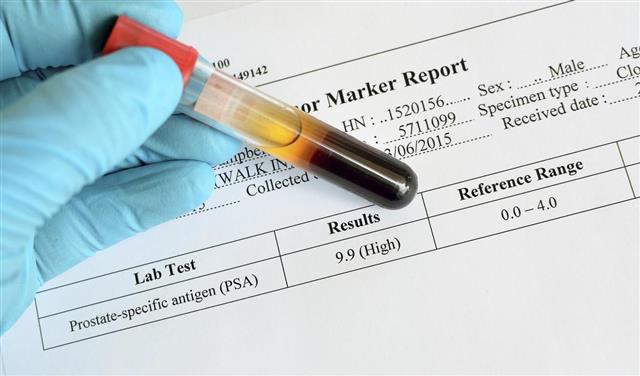
PSA testing is a screening test for prostate cancer. In this article, we discuss the possible causes behind elevated levels of PSA.
PSA stands for prostate specific antigen, which is a type of protein produced by the prostate gland. A significantly high level of PSA in the blood is sometimes considered as an indicator of diseases like benign prostatic hyperplasia (BPH) and prostate cancer. A PSA test is basically performed for the early detection of prostate cancer. However, a high level of this antigen alone is not sufficient for a confirmed diagnosis of prostate cancer, for which this test is sometimes followed by digital rectal exam (DRE) and biopsy. Moreover, a high level of this antigen can also be associated with other benign or non-cancerous conditions.
What Causes PSA Levels to Elevate?
- An elevated PSA level may indicate several things, and may or may not be associated with cancer of the prostate gland. More commonly, it can be associated with some non-cancerous conditions like enlarged prostate or BPH, which is quite common among the elderly. Unlike cancer, it does not spread to any other part of the body. Other than BPH, it could be an indicator of prostatitis or inflammation of the prostate gland.
- Apart from the various health problems, a slight increase in the PSA value can be observed in men who have recently undergone prostate biopsy and DRE. Even recent ejaculation or riding a bicycle can cause the PSA level to rise slightly. Intake of certain medications can also affect the level of this antigen. Therefore, one should disclose all information pertaining to the use of medications to their physician before the test, in order to ensure a proper evaluation of prostate health.
PSA Levels and their Meaning
The level of PSA is measured in nanograms per milliliter (ng/mL) of blood.
» It is considered that a value under 4 ng/mL is normal. However, according to The American Cancer Society, a value falling in the range of 4 to 10 ng/mL indicates a 25% chance of prostate cancer.
» The same values may also indicate prostatitis and benign prostatic hyperplasia or BPH. A value higher than 10 ng/mL may be indicative of an increased risk of getting prostate cancer.
Therefore, a lot of controversies exist regarding the normal level of PSA. Even factors like inflammation within two days of having this test can cause the PSA level in the body to rise slightly. Moreover, this antigen’s level in the body usually rises with growing age, which leads to the formulation of age-adjusted PSA.
| Age | Normal PSA Level |
| Up To 50 Years | Up To 2.4 ng/mL |
| 51 – 60 Years | Up To 3 ng/mL |
| 61 – 70 Years | Up To 4 ng/mL |
| 71 and Above | Up To 5 ng/mL |
» In addition to the value of PSA, its velocity and density are two other factors which are taken into consideration while performing the screening test. PSA velocity refers to the change in the PSA concentration over time, while PSA density is the comparison of PSA concentration to the volume of the prostate gland. Measuring this antigen’s density is important as its level is usually higher in a man with larger prostate gland. This test has been approved by the U.S. Food and Drug Administration (USFDA) to help in the detection of prostate cancer in men aged 50 years or more. This test has also been approved to monitor the patients with a history of prostate cancer, in order to detect recurrences.
» Sometimes, a high level of PSA may indicate only non-cancerous enlargement of the prostate. At the same time, low-level of prostate-specific antigen also does not rule out the possibility of cancer. The relative survival rate of prostate cancer for 10 years is around 90%. To sum up, this test is not perfect, as it is prone to ‘false positive’ and ‘false negative’ test results. A false positive test (high level of PSA in the absence of cancer) is usually followed by other diagnostic tests, which can not only be costly, but can carry certain potential risks for the individual as well. On the other hand, false negative results may show the PSA to be in the normal range, even when the cancer is actually present.
However, this test can still help many people to ensure an early diagnosis of prostate cancer. It is very important and mandatory to consult your health care provider for detailed information or any doubts regarding the PSA levels and tests with regards to your specific case.
Disclaimer: The information provided in this article is solely for educating the reader. It is not intended to be a substitute for the advice of a medical expert.





